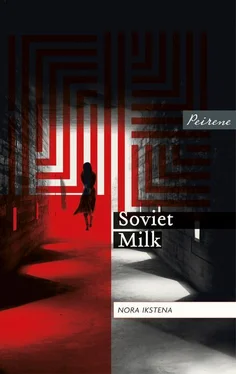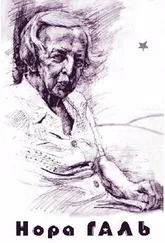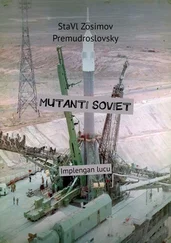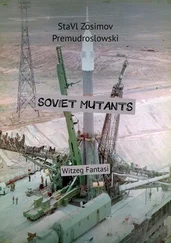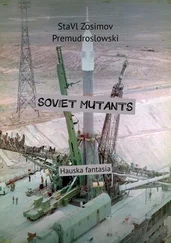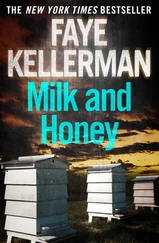Preparing an instant coffee in her aunt’s small kitchen, my mother hears a reminder on the crackly battery-powered radio that it’s January 1969. One of those youthful January mornings when she would hurry to finish memorizing the idiocies of science under Communism, and devote the rest of her time to questions of medicine and the origins of life, and to reading photocopies of smuggled books by Pasternak and Sartre. She would be a doctor and a scientist, come what may. For the moment she easily manages to regurgitate the official programme, while simultaneously acquiring a totally different, prohibited education. Her mother and aunt are worried about her. My mother can spend days in her room, just reading books. She’s already nearly twenty-five, but has never been seen with a young man. Is she attractive? She has delicate bones, small hands and firm round breasts, light hair which she occasionally bleaches, and freckles. She’s not concerned about what she wears. She even goes to university in wide, comfortable trousers, although she can feel the shocked stares of her instructors and fellow students. Trousers are only acceptable on Saturdays or when working at the kolkhoz . At all other times one has to wear skirts reaching to mid-knee or, of course, conservative minis, when they’re in fashion.
While her aunt fries potatoes for her husband’s breakfast, my mother drinks bitter coffee, gazes out of the window and thinks about the great whale with which the captain is obsessed in Moby-Dick .
In the evening her mother and aunt make her put on a dress that their brother has sent from England. She must go to the village dance and stop burrowing among those books. The local band will be playing, there will be refreshments and, crucially, dancing. May the city bookworm dance up a storm with the country boys. The two sisters drive her right to the door.
What she sees inside doesn’t compare to anything she’s experienced before. On the stage a singer is gesturing stiffly. Several couples are moving around the dance floor, some freestyle, others waltzing. At the side of the room hefty country girls with self-fashioned beehives crowd around the buffet tables. Young men fidget on the other side.
What is she doing here? She doesn’t understand; it is a kind of bitiye and nichto – a Sartrean being and nothingness. But the English dress soon attracts stares. As does her smooth, blonde boy’s haircut.
She hopes that her mother and aunt are no longer standing at the door like the mythical Cerberus, ready to push her back through the seven circles of hell. To make sure, she’ll stay a little while longer. Then she’ll leave, will sit by the lake and afterwards go home, as if she had danced her fill and the young man who accompanied her home had been too shy to come in.
She settles in a corner and, gazing at the dancing couples, almost cheers up. Then a young man saunters towards her across the dance floor. She hopes he’ll change direction but soon it’s clear: he’s coming straight for her. Politely, he asks her to dance. She doesn’t even remember that she could say no. She simply gives him her hand and they join the dancers. He waltzes with assurance. Now and then his cheek touches hers and she realizes that this isn’t unpleasant. Between dances they do as the other couples: stand apart, not knowing what to do with their hands, waiting for the next song to begin. After the tenth dance he suggests they have some wine. There’s a crowd at the tables but he easily slips through the crush and surfaces with two full glasses. They sit down at the side of the room.
She’s going to be a doctor, a scientist.
He is working in a mechanics workshop for the time being. How did she happen to be here?
She’s staying with her mother’s sister at the farm.
How does she like it in the countryside?
Fine. If she had her books, she could live in the country.
How does she plan to earn money?
She’ll be a scientist.
Ah. He’d like to study to be an aviation engineer. Would she like to dance some more?
No.
Can he accompany her home?
Yes.
The January night is unusually warm. They walk down to the lake, which is still not iced over. He gathers some flat stones and shows her how to make them skip. Just as her thoughts skip over the surface when she tries to understand Feuerbach. The stone brushes the water’s surface and then flies up again, but to earn her diploma she’ll have to explain Feuerbach’s atheism – the stone sinks.
He invites her to drink some tea with him, in a nearby guard’s hut, where they spend the night.
*
After my father’s death I slowly grew to hate both my mother and our general situation. Troubled by her own history, she urged me to learn everything my teachers wanted, not to talk back and to be an active member of the Communist youth organizations. My mother was protected by my stepfather. Once a soldier in the victorious army of the Great Patriotic War, both his service in the guard of Latvia’s president and his brother’s voluntary enlisting in the German army were obscured by this illustrious background. The bloody polka of history.
My mother and stepfather would discuss their brothers late into the night. My stepfather’s brother had been executed as a traitor, before which he’d been tortured for some previous, unspecified betrayal. ‘Those Russian dogs,’ my stepfather would mutter. I didn’t understand. He had marched shoulder to shoulder with those dogs almost as far as Berlin, and enjoyed May and November festivities with them, and received a food parcel with rarities such as dry-cured sausage, instant coffee and marinated pickles and tomatoes.
My mother’s brother was alive and well in London. He owned a cloth factory and sent packages with things unseen here: beautiful fabrics, skeins of wool and patterns, from which my mother sewed our clothes. Twice a year my mother sent the Soviet agencies a request for permission to visit him. Twice a year she received an official reply with the decision netselesoobrazno – non-essential. Her ten-year communication with the regime ended once again with netselesoobrazno : the response to her last request for permission to go to London, for her brother’s funeral.
Despite these absurdities, my mother continued to raise me as an honourable and faithful young Soviet citizen. Yet within me blossomed a hatred for the duplicity and hypocrisy of this existence. We carried flags in the May and November parades in honour of the Red Army, the Revolution and Communism, while at home we crossed ourselves and waited for the English army to come and free Latvia from the Russian boot.
Having honourably fulfilled my hypocritical role at school, I grew bookish and withdrawn. When a professor living on the floor above us died, the new tenants simply jettisoned his library via the window. An enormous heap of books built up in the yard. My mother didn’t hide her disapproval when I lugged the old multi-volume medical encyclopedia up the stairs, but she didn’t object, so as not to widen the breach between us.
And here it all was: the truth about the wretched, hypocritical creature we call man. A muddle of blood vessels, convolutions of intestines, glands and secretions, lymph nodes and arteries, phalli and vaginas, testicles and wombs. In this narrative, death was just an accidental, unavoidable stopping point.
*
Thinking about my mother, about her birth and mine, I can’t help thinking about predetermination, or maybe some great, incomprehensible plan. I picture my mother not as a medical student in Soviet Latvia carrying an unwanted baby in the grey Riga autumn but instead with a bandanna tied around her forehead, her fat tummy half-bared, in that parallel world where freedom reigns and The Who are singing at Woodstock.
Читать дальше
